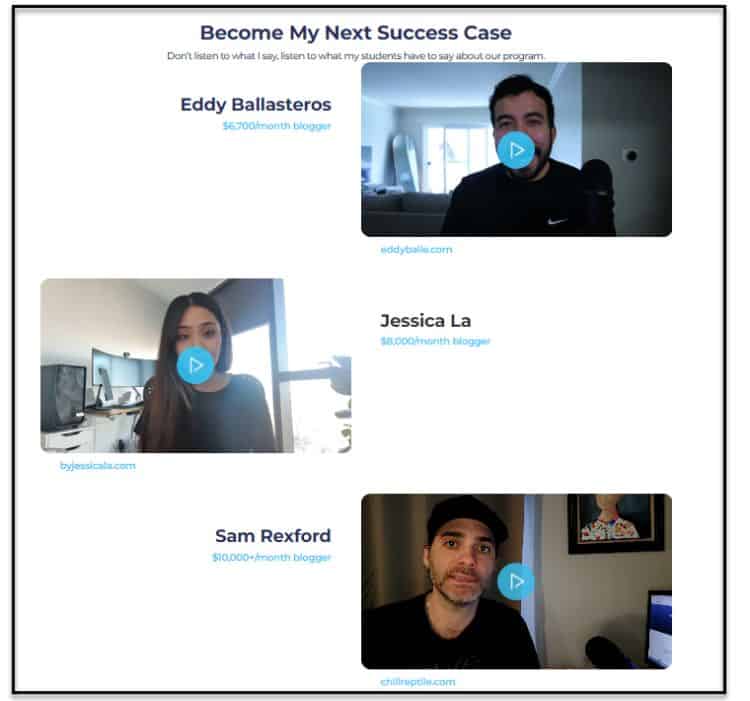How To Start A Coaching Business (Online And Offline) In 2024

We all have skills and talents that we can share with others, and there’s no better way to make a living than by helping those around us reach their potential.
If you’re thinking about starting a coaching business, there’s no better time to do it than now.
With various coaching platforms allowing you to connect with clients online and membership site platforms aimed at building a community of like-minded individuals, there are more opportunities than ever to get started in this rewarding industry.
In this ultimate guide, I’ll detail how to start a coaching business, both online and offline.
This will help you decide which path is right for you and give you the information and resources you need to start your coaching journey.
The Steps To Consider When Starting A Coaching Business
Here are the steps to consider when embarking on this endeavor.
1. Learn To Coach
An offline and online coaching business involves a process that helps people achieve their goals.
Coaches help their clients to identify what they want and then figure out a plan to get there.
Coaching is not about giving someone theoretical advice; it’s about helping them find the exact solutions to their problems.
To do this, coaches ask many questions and use various techniques to help their clients move forward in their lives.
To be a successful coach, you need to have several skills:
- You need to be good at listening and asking questions. This will help you understand your client’s needs and help them find the right solutions.
- You need to empathize with your clients and understand what they are going through.
- You need to be patient and supportive and be able to help your clients stay on track even when they feel overwhelmed or discouraged.
- You need to be able to think on your feet and come up with creative solutions to problems.
- You also need to be organized and efficient, keep track of your client’s progress and manage your own time well.
The best way to develop these skills is by practicing them.
You can do this in several ways:
- Join an online coaching group or forum and offer to shadow other coaches as they help various members. This will allow you to see how more experienced coaches do it and get feedback from them.
- Volunteer to coach a team or organization that you are passionate about. This will allow you to help others achieve their goals while developing your coaching skills.
- Attend coaching workshops or coaching sessions. These programs will allow you to learn from experienced coaches and practice your coaching skills.
- Read books or articles about coaching, listen to podcasts or watch videos about the area you want to coach people in. This will help you learn more about the coaching process and how to provide the best advice and solutions possible.
In essence, being able to coach someone starts with having a desire to help them, being patient along the process, and, most importantly, taking the time to consider the best way to deliver information in a way that it is successfully consumed.
2. Create Your Business Strategy
Often, entrepreneurs want to get the ball rolling as quickly as possible and just go.
However, a successful coaching business needs to have the right strategy.
This will help you determine your target market, what services you’ll offer, and how to find clients.
To get started, answer the following questions:
- Who is your target market? (Think about age, gender, occupation, interests, etc.)
- What type of coaching do you want to offer? (Life, business, relationship, health, etc.)
- What are your unique selling points? (What makes you different from other coaches?)
- How will you reach your target market? (Online marketing, networking, referrals, etc.)
With coaching services becoming increasingly popular, you must have a strategy to make your business stand out.
Coaching clients becomes more manageable when your coaching program follows a plan that has been thought out and is organized.
This will also give you an idea of how much time and energy you need to put into your coaching business weekly and monthly.
Setting Up Your Legal Business And Using The Right Tools
Setting up your financials is also essential when starting your own business.
LLC services can help protect your assets in case your business is sued.
For coaching businesses offering potential clients advice on how to improve their lives, this is an important consideration.
Using business planning software and tools can also help you get your business off the ground and ensure its success in the long term.
Such tools help small business owners to develop a clear business plan, track their progress and make necessary changes along the way.
3. Think About The Brand Of You
Generally, one key aspect of starting your own business and entrepreneurial journey comes down to building what I like to call ‘the brand of you’.

Image credit: Adam Enfroy’s YouTube channel
Whether you’re building a blogging business and offering content marketing consulting or launching an e-commerce business consulting practice that advises people on how to use ecommerce platforms to their advantage, you’ll need to think about the brand of you.
This includes everything from your business name to the colors you use on your website and beyond.
It’s all a part of marketing and building a personal brand that resonates with your target audience.
When thinking about the brand of you, ask yourself the following questions:
- What am I great at and can offer as a service others can’t?
- Who is my target audience?
- What do I want my business to be known for?
- How can I make my business stand out in a saturated market?
- What leverage do I have that others don’t?
Your answers to these questions will help you start laying a foundation for your business.
For new coaches, this might be a challenging exercise to go through, but it will be beneficial to establish these key elements early on.
It will also give clues on how to brand yourself and what marketing strategies will best reach your target audience.
Your Coaching Model
Your coaching model also comes into play when building your brand in the coaching niche.
The most common models to get started with in a coaching practice include one-to-one coaching and group coaching.
The great thing about being a coach is that you can offer your services in various ways to reach more people and make a more significant impact.
As such, you’re not limited to one-on-one or group coaching forever – you can always experiment with other models as your business grows.
However, when you’re just starting, it’s essential to focus on one model and perfect it before moving on to others.
This will help you build a solid foundation for your coaching business that you can expand upon later.
Getting Certified – Or Not
As part of building your brand and getting your business model on point, you can also decide to get certified – if you aren’t already.
Depending on the type of coaching you’ll deliver, this may or may not be required.
For example, if you want to offer life coaching services, you’ll likely need to get certified through an accredited life coaching program.
On the other hand, if you’re looking to get into business coaching or executive coaching, then certification may not be as big of a deal since these types of coaching don’t necessarily require it.
Instead, real-world experience, an understanding of business, and other relevant credentials may be more critical in these markets.
Of course, there are always exceptions to the rule, so it’s best to research what’s required for the type of coaching you want to get into.
Your marketing plan should also factor in whether or not you will get (or already are) certified and what that means for your business.
For example, if you hold specific certifications, you’ll want to include that in your marketing efforts, as it can be a selling point for potential clients.
Successful coaches with the credentials, expertise, or both, are not afraid to share this when attracting high-paying clients.
4. Create Your Online Coaching Service Website And Social Media Presence
Attracting new clients as a startup coaching business can be a challenge.
By creating a professional-looking coaching website and developing an active social media presence, you can quickly get the word out about your new business and start attracting customers.

When designing your website to attract clients, you don’t have to create a complex structure that takes months or years to develop.
However, at the very least, be sure to include information about the following:
- An overview of your coaching services
- A list of the benefits of working with you as a coach
- Testimonials from satisfied clients
- Your contact information
Moreover, ensure your website is easy to navigate and appeals in a visual way to your target audience.
Use high-quality images and videos, and make sure your website is responsive so it can be viewed on all devices.
In addition to your website, you’ll also want to create social media accounts for your coaching business on platforms like Instagram, Tiktok, and LinkedIn.

Choose the best platform for the coaching you’ll be providing and ensure to populate this account with content that interests and engages your target audience.
This can include blog posts, infographics, images, videos, and anything else that will force someone to pay attention to your business.
Social media management tools can help with this by making it easy to post content to your account (and multiple ones down the line) and help you track the performance of your posts.
5. Price Your Coaching Plan
Providing great value to clients and making money is the name of the game for a profitable coaching business.
Both an offline and an online coach needs to consider pricing as part of running a successful business.
Depending on the niche, the average cost of a coaching program can range from double digits per hour to over four figures.
The best way to determine your coaching prices is to survey your target market and determine what they are willing to pay for your services.
Do your due diligence and answer these questions:
- What is the average cost of coaching services in my area/industry?
- What do I need to charge to make a profit?
- How can I differentiate my services from others to justify a higher price?
- What are the benefits of working with me as a coach, benefits that others can’t offer?
Here are some further tips on pricing.
Price Your Coaching Services Competitively
The price of doing business today is more competitive than ever.
To stay ahead of the curve, it’s essential to price your coaching services at a rate that is in line with the market.
Price Your Coaching Services So That You Make A Profit
At the same time, it’s essential to find a niche that you are passionate about but also one in which you can make a profit.
While you want to provide the best service possible, you must make enough money to support yourself and your business.
Price Your Coaching Services So That You Offer More Value Than The Money You Ask For
Consider that you are coaching someone on how to make money online from home.
If you can help the person make $10,000 per month through your coaching, and you’re only asking for a one-time fee of $6000, that is a deal everyone should say yes to – every single time.
Since you’re in the business of improving people’s lives, it only stands to reason that you want to provide more value for your clients than the amount of money you are asking for.
Offer Benefits To Clients Who Work With You As A Coach
When pricing your coaching services, offer clients benefits they can’t find anywhere else.
Some benefits may include a money-back guarantee, a free consultation, or access to exclusive resources.
6. Locate The Right Customers Through Marketing
While many people have tons of business ideas, marketing is the downfall of quite a few potential coaching businesses.
You could have the best product or service on the market, but customers will never know about it if you don’t market it well.
The good news is that technology has made marketing more accessible than ever.
You can implement various strategies to reach your target market, whether your coaching business is online or offline.
Some popular marketing channels include:
- Social media platforms like Facebook, Twitter, and Instagram
- Email marketing
- Content marketing (blogging, infographics, etc.)
- Search engine optimization (SEO)
- Pay-per-click (PPC) advertising
- Traditional marketing methods like word-of-mouth and print advertising
Marketing your coaching business will allow you to get your first client and every one after that by following a similar process and always making it slightly better.
It will also help you build your brand and get your coaching business in front of the right people.
7. Be Open To Receiving Feedback From Your Clients
While frequently doing market research and improving your skillset as much as possible is essential to a successful coaching business, you also need to take feedback from your clients seriously.
No business is ever perfect, and there’s always room for improvement.
Your coaching business will be no different.
Whether you’re starting an online coaching business or an offline one, make sure you’re open to feedback from your clients – good and bad.
Then, use that feedback to make changes in your business.
This could be anything from changing your prices to altering how you deliver your coaching services.
Doing this will make you much more likely to succeed in the long run.
Also, when you get positive feedback, use this as testimonials on your site to attract more clients.

There’s no point in having great feedback in your email inbox when you could use it to get more business.
Types Of Coaching You Can Deliver
With so many areas of interest that people want to explore and get better at, there are many different types of coaching you can deliver – both online and offline.
Here are some of the top ones.
Health And Fitness Coaching
Whether offering one-to-many classes on Zoom or coaching people in person, health and fitness coaches are always in demand.
If you are passionate about helping people get fit and healthy, this could be the perfect coaching business for you.
As a health coach, there are many different niches to explore, so make sure you choose one you’re passionate about.
Whether it’s helping people over 50 get fit or teaching new moms how to eat healthily, there’s a niche for you.
Personal Development Coaching
Personal development is another area where people are always looking for help.
If you’re good at helping people overcome challenges and achieve their goals, then personal development coaching could be for you.
Like health and fitness coaching, there are many different niches within the personal development coaching industry.
For example, you could get into wellness coaching as a sub-niche and help people with things like stress management and work/life balance.
Career Coaching
With so many people struggling to find their dream job or move up the career ladder, it’s no surprise that career coaching is in demand.
If you have experience in a particular industry or know how the job market works, you could use your knowledge to help others.
Business Coaching
Business coaching is another popular type of coaching, especially with the rise of entrepreneurship.
If you have experience starting and running a successful business, you could help others do the same.
Subniches in this area include things like startup coaching, small business coaching, and marketing coaching.
Relationship Coaching
When you coach clients on their relationships, you can help them in both their personal and professional lives.
If you’re good at giving relationship advice and helping people communicate better, this could be your coaching niche.
Online Vs. Offline Coaching
A big decision you might have to make when starting your coaching business is whether to offer online or offline services.
There are advantages and disadvantages to both of these; thus, it’s essential to weigh the pros and cons before deciding which suits you.
Here are some of the main differences between online and offline coaching:
Offline Coaching
Here are the aspects to consider with offline coaching.
Advantages:
- You can build deeper relationships with your clients.
- You can better understand your client’s body language, which can help detect their emotional state.
- There’s no need for expensive equipment; you only need a quiet room and a comfortable chair.
Disadvantages:
- It can be hard to find clients if you’re not in a major city.
- You’re more limited to the number of clients you can see daily.
- Depending on the type of coaching, you may need to rent space, which can be expensive.
Online Coaching
On the flipside, here are the pros and cons of online coaching.
Advantages:
- You can reach a wider audience, no matter where you live.
- You can work from anywhere in the world.
- All you need is a laptop and an internet connection.
- You’re not limited by time or geography.
- You can scale your business more easily.
Disadvantages:
- It can be harder to build relationships with clients online.
- There’s a risk of technical issues, such as dropped calls or bad internet connection.
Ultimately, whether to coach online or offline is up to you.
There are pros and cons to both, so it’s essential to think about what’s most important to you.
You might also want to consider a hybrid approach, where you coach some clients online and others offline.
This can provide the best of both worlds and help you reach the widest audience possible.
Wrap Up
So, that’s how you can start a coaching business, whether you choose to go the online route or the offline route.
Both approaches have pros and cons, so it’s up to you to decide which is best for you.
Following the above steps will help you get started on the right foot and set you up for success.
Remember to be constantly learning and evolving as a coach so that you can continue to help your clients reach their goals.
Do you prefer online or offline coaching?
Which area do you consider yourself knowledgeable in?
Let me know in the comments below!
Further reading on AdamEnfroy.com: Many coaches find that creating an online course and selling it successfully is the best transition to packaging the experience obtained from coaching and turning it into an online product.
This can be a very effective way to monetize your coaching business even further.
Here are the best online course platforms to consider if this is something that interests you.





